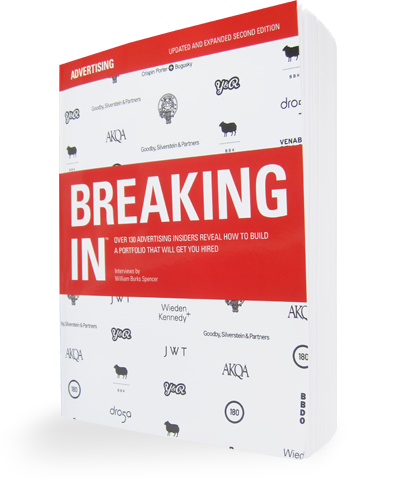Check out some great work from Scott Vitrone & Ian Reichenthal.
WS: What do you look for in a student book? And what impresses you?
SV: I think one of the better junior books that we remember, Ian and I both said the same thing when we saw it: that we felt like we just met the person. You could feel his personality coming through it—through the work. And it was just subtle things. You could kind of get an idea of who this guy was and what his voice was like. And a lot of times you don’t see that. More often, you see books that try to reflect what people think a great book is supposed to look like.
IR: We’re not talking about a book where all the campaigns were alike, or that they all seemed like they were coming from the exact same voice. It wasn’t that. It was just…
SV: It was skewed a little bit.
IR: Yeah. It was just that this person had a point of view on each assignment that was different. If you gave the same assignments to 1,000 people, I bet nobody would have come up with the same idea for any of them.
WS: What do you think about sketches? If the idea is strong enough does the presentation matter?
SV: I think it’s been made to matter. If you combine a great idea with great execution, it’s going to resonate a little more than a great idea…the same great idea just in a comp form. It’s just the same in an agency. You have a great idea on paper, then production hopefully enhances that.
IR: If we had our choice…if we had to choose between two books, one that was really polished but filled with bad ideas and a book that was filled with really great ideas but not so polished, obviously we’d pick the one with the great ideas in it. But it’s probably true that, if you have great ideas and you know how to produce them well, that would be more valuable than just the book full of great ideas in sketch form. It’s part of what we’re going to ask of a new team…a lot of their job is putting ideas together.
[ … ]
WS: If you were to give someone who was just starting out advice on how to put together a book, or how to get into the industry, what would you say?
SV: Give it the proper amount of time. About two years. You have to commit to it. When I started, I tried to half-ass it. I was working full-time and was trying to do it at night, and do it by myself. And it showed. It wasn’t until I fully committed, and surrounded myself with people who wanted to do the same thing, that I got traction. So you’ve got to give yourself enough time and fully, fully commit.
IR: I don’t know if I have any single pearl of wisdom for that question. But I would say, be honest about the stuff in your book. You have to be able to look at your own work and kill it if it honestly isn’t up to par. And that’s hard to do. Especially at first, your honesty about what’s in the book is fighting your urge to be done with the whole process. They’re fighting each other. You really, really want to be done with it and get out there and get a job. So you want to believe that the book is finished. But really, you have to—even with all of that going on—you have to really look at it and be painfully honest with yourself and say, “That ad’s not ready–that’s not ready to go in yet.”

Comments are closed.